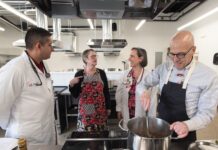
As the nation gets set to celebrate Veterans Day on Nov. 11, a pair of new state-of-the-art microscopes have been provided by the Veterans Health Administration to the University of Louisville.
UofL researchers will use the microscopes to continue their close working relationship with the Clinical Research Foundation (CRF) at the Robley Rex VA Medical Center to understand how environmental exposures cause health effects in military veterans.
The multiphoton confocal microscopes, valued at nearly $2 million, will help the researchers discover the mechanisms behind health effects that have been documented by veterans and their health providers and finding ways to prevent or reduce their impact. The new instruments provide 3-D images of thicker tissue samples than were previously accessible, allowing the researchers to better see changes in biological tissues and metabolic functions in response to specific substances such as benzene and aldehydes.
The new microscopes are housed in spaces allocated by the UofL School of Medicine to the VA hospital, one in the Center for Cardiometabolic Science (formerly the Diabetes and Obesity Center), part of the Christina Lee Brown Envirome Institute, where it will be used to study heart and vascular functions, as well as immune responses in animal models. The other is in the Hepatobiology and Toxicology Center for Biomedical Research Excellence (COBRE) and will be used to understand the effects of environmental toxins on the liver.
“We are exceptionally grateful to the VA for providing this new technology, which will allow our researchers to have a greater understanding of the impacts and effects of wartime exposure on the health of our veterans,” said Toni Ganzel, dean of the UofL School of Medicine. “And we are pleased that the UofL School of Medicine is partnering with the VA and Clinical Research Foundation to improve care for our veterans as well as citizens of Kentucky and beyond.”

Most imaging methods enable scientists to see only small, thin sections of tissue at a time. The images from the larger, thicker samples captured by the new multiphoton microscopes allow scientists to study the metabolic processes taking place.
“The multiphoton microscope uses lasers that can penetrate more deeply into a much thicker section of tissue rather than a very thin slice,” said Steven P. Jones, director of the Center for Cardiometabolic Science and professor of medicine. “Using the system, we can look in real time at what is happening in immune cells that may be trafficking to the liver, skeletal muscle, adipose depots and the heart.”
Matthew Nystoriak, associate professor of medicine, investigates the effects of inhaled substances on the cardiovascular system.
“We can look at the molecular processes behind different disease development that affect a broad section of the population,” Nystoriak said. “One of the things we want to look at is vascular inflammation. With this instrument, we can track immune cells leaving the bloodstream and infiltrating the walls of blood vessels.”
The liver research, led by Matthew Cave and Craig McClain, both professors of medicine at UofL and physicians and researchers affiliated with Robley Rex VA Medical Center, will include evaluating the effects of environmental exposures on liver diseases and the metabolic syndrome, studying interactions of environmental exposures with nutrition and with alcohol intake, and investigating clinically-relevant exposures such as those related to Camp Lejeune and to burn pits.
The VA has increased this research as a result of the PACT Act, recently signed into law to help veterans suffering negative health effects from war and peacetime exposures related to burn pits and other service-related activities. The act improves access to medical care for conditions resulting from these exposures through VA Medical Centers and helps the VA improve research, staff education and treatment related to those exposures.
“The VA enjoys a close relationship with UofL researchers, and this state-of-the-art equipment will be utilized to advance the research agenda of the VA , including allowing VA-affiliated researchers to apply the latest scientific methods to the investigation of respiratory, gastrointestinal, liver and metabolic diseases that commonly affect veterans,” said Gerald Dryden, professor of medicine at the UofL School of Medicine and associate chief of staff for research and development at Robley Rex VA Medical Center. “This will be especially important as we begin to look into the causes and effects of chronic burn pit and other environmental exposures on veterans’ health.”
The CRF is a nonprofit corporation that provides the administrative infrastructure dedicated to Robley Rex VA Medical Center researchers under the U.S. Department of Veterans Affairs (VA). The CRF also works with UofL to provide groundbreaking research opportunities to veterans and active military in the Louisville area.
Nonprofit corporations (NPCs) such as CRF were established to provide a more efficient mechanism for VA researchers to participate in research and educational programs funded by private and non-VA public sources. There are more than 80 NPCs nationally, each affiliated with a VA medical center, who collectively have a resource and voice through the National Association of Veteran Research and Education Foundation.
Michael Book, executive editor of the CRF, underscored what this investment means for the partnership in the future.
“These microscopes further advance the research capabilities of the incredible investigators in our region,” said Michael J. Book, executive director of the CRF. “The equipment will aid in attracting other investigators to the groundbreaking work being done at Robley Rex VA Medical Center and the University of Louisville. Beyond the technological advancement, the investment also signifies the importance of the strong relationship between VAMC, the University of Louisville and the Clinical Research Foundation. We are excited to be a part of the innovation that lies ahead.”






























